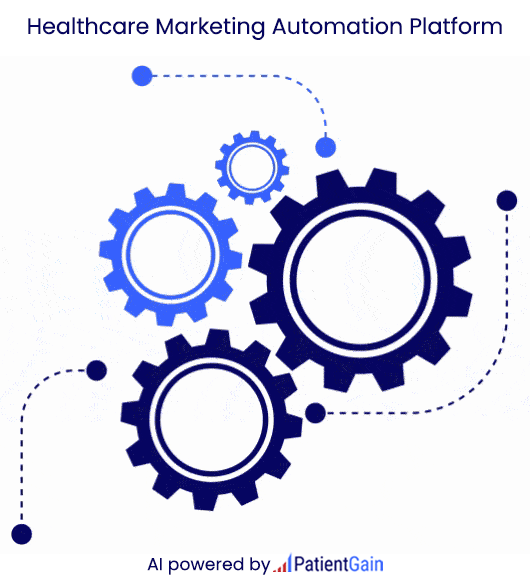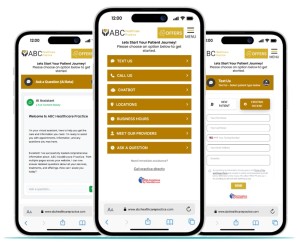Specialized platform for the healthcare marketing: What does it contain and how much does it cost?
What’s Inside a Specialized Healthcare Marketing Platform?
There are several important aspects of a marketing platform, specifically designed for healthcare practices, small or large. Technology, and HIPAA compliance are the obvious requirements, however it goes much beyond these 2 requirements.

1. Compliance and privacy management
Compliance is a defining feature that distinguishes specialized platforms from general ones.
- HIPAA compliance: Manages all patient data and communications in accordance with strict regulations to protect patient privacy.
- Security features: Includes data encryption, multi-level authentication, and access controls to prevent unauthorized access to sensitive information.
- Business Associate Agreements (BAAs): Provides a framework for vendors to define their responsibilities for handling protected health information.


2. Healthcare domain knowledge and focus on patient safety
Healthcare marketing platform companies must adhere to ethical standards and always look at healthcare marketing as a patient would view it.
- HIPAA compliance: Manages all patient data and communications in accordance with strict regulations to protect patient privacy.
- Security features: Includes data encryption, multi-level authentication, and access controls to prevent unauthorized access to sensitive information.
- Business Associate Agreements (BAAs): Provides a framework for vendors to define their responsibilities for handling protected health information.
3. Technology platform and constant development of automation apps and AI based improvements
Healthcare marketing platform companies must have a secure technology platform. And they must be focused on improving the work flows of healthcare practices.
- HIPAA compliance: All applications, and related technology must comply with HIPAA and PHI.
- Security features: Applications and servvers should have data encryption, multi-level authentication, and access controls to prevent unauthorized access to sensitive information.
- Business Associate Agreements (BAAs): Provides a framework for vendors to define their responsibilities for handling protected health information.
Examples from PatientGain.com – What’s Inside a Specialized Healthcare Marketing Platform? A Deep Dive with PatientGain.com
The Modern Healthcare Marketplace: A Look Inside Specialized Marketing Platforms, Featuring PatientGain.com. PatientGain is a US-based, web-based technology platform offering marketing automation and patient communication tools for medical and dental practices. The platform uses AI and data analytics for patient acquisition, lead management, online reputation management, and personalized patient engagement. It provides a suite of HIPAA-compliant apps for features like chatbots, 2-way texting, and online appointment scheduling, helping healthcare providers streamline operations and improve patient retention.
At its core, a specialized healthcare marketing platform is an all-in-one solution that helps healthcare providers manage their online presence, engage with patients, and grow their practice. A crucial and non-negotiable feature of any reputable platform is HIPAA (Health Insurance Portability and Accountability Act) compliance, ensuring that all patient data is handled securely and confidentially. PatientGain.com, for example, emphasizes this by offering a Business Associate Agreement (BAA) and ensuring all their applications and websites are HIPAA compliant.
Here’s a breakdown of the key components of these platforms, with specific examples from PatientGain.com:
- Patient Relationship Management (PRM) or Customer Relationship Management (CRM): This allows for the tracking of patient interactions, management of appointments, and automation of communication. Some well-known HIPAA-compliant CRMs include Salesforce Health Cloud Healthcare. PatientGain.com’s integrated, HIPAA-compliant CRM is designed to manage the entire patient journey, from initial lead capture to ongoing engagement. It consolidates patient inquiries from various channels—including phone calls, text messages, website forms, and social media—into a single, user-friendly dashboard. This centralized system allows practices to nurture leads, track conversions, and personalize communication, ultimately improving patient acquisition and retention.
- Reputation Management: Apps are essential for building trust and a positive online reputation. PatientGain.com offers dedicated reputation management applications starting at $399/month. These tools automate the process of soliciting reviews from satisfied patients, intercepting negative feedback before it’s posted publicly, and showcasing positive testimonials on the practice’s website and social media channels. For instance, a dental clinic using PatientGain.com’s reputation management app could send a review request to a patient via email or text message after their appointment. If the patient indicates a positive experience, they are directed to a public review site like Google. If they report a negative experience, their feedback is sent directly to the practice for internal resolution, helping to maintain a high online rating.
- Patient Acquisition and Lead Generation: These features focus on attracting new patients through various digital channels. This can include everything from online advertising and content marketing. PatientGain.com’s patient acquisition platform, with packages ranging from $799 to $1,999 per month, employs a multi-faceted approach. They create and manage targeted ad campaigns on Google, Facebook, and Instagram, and their AI-powered chatbots engage with website visitors 24/7 to answer questions and capture leads. For example, a MedSpa could use PatientGain.com to run a “Coolsculpting deals near me” ad campaign, driving traffic to a landing page with a lead capture form. The platform’s CRM would then automatically follow up with interested leads via email and text message, nurturing them towards booking a consultation.
- Medical Search Engine Optimization (SEO): Specialized SEO tools help healthcare providers rank higher in search engine results for relevant keywords, making it easier for potential patients to find them. PatientGain.com’s medical SEO services, starting at $800/month, focus on a content-centric strategy that emphasizes expertise, authoritativeness, and trustworthiness (E-A-T). They create high-quality, unique content for their clients’ websites, optimize for local search terms (e.g., “urgent care near Disneyland”), and build a strong backlink profile. An example of this in action would be an allergy practice in Atlanta. PatientGain.com would create content pages on topics like “common allergy triggers in Georgia” and “the benefits of allergy testing,” helping the practice rank for relevant search terms and attract patients actively seeking information about their services.
- Content Management System (CMS): A user-friendly CMS allows practices to easily update their website with blog posts, patient testimonials, and other educational content. PatientGain.com provides its clients with a WordPress-based website that is fully optimized for SEO and conversion. Their team of medical writers can create and post regular blog content, ensuring the website remains fresh and relevant to both patients and search engines.
- Healthcare Analytics: These platforms provide robust analytics and reporting dashboards to track key performance indicators (KPIs), measure the return on investment (ROI) of marketing campaigns, and gain insights into patient demographics and behavior. PatientGain.com offers a comprehensive marketing dashboard that consolidates data from all marketing channels. This allows practices to track website traffic, conversion rates, and the cost per lead for each campaign, enabling them to make data-driven decisions and optimize their marketing spend.
- Patient Communication and Engagement Tools: This can include automated appointment reminders, secure messaging, email newsletters, and patient satisfaction surveys to enhance the patient experience and foster loyalty. PatientGain.com offers a suite of patient engagement tools, including a 2-way texting app (from $199/month), an intelligent conversion chatbot (from $200/month), and monthly email marketing services (from $299/month). For example, a primary care physician’s office could use the 2-way texting app to send appointment reminders, answer patient questions, and even send a “happy birthday” message, fostering a stronger patient-provider relationship.
The Cost of Attracting and Retaining Patients: A PatientGain.com Perspective
The pricing for specialized healthcare marketing platforms varies widely based on the features included, the level of customization, and the size of the healthcare organization. PatientGain.com offers a transparent pricing structure with a variety of packages to suit different needs and budgets:
- Subscription-Based Models: Many platforms operate on a monthly subscription basis. PatientGain.com’s most popular packages, the GOLD and PLATINUM solutions, start at $799/month and $1,399/month, respectively. These comprehensive packages include a website, SEO services, a suite of marketing and communication apps, and a dedicated project manager.
- Tiered Pricing: It’s common for platforms to offer tiered pricing plans. PatientGain.com’s tiered structure allows practices to choose the level of service that best fits their needs. For example, the PLATINUM package includes all the features of the GOLD package, plus additional services like more in-depth SEO and social media management.
- A La Carte Services: Some companies offer individual services, and PatientGain.com is no exception. They offer a variety of a la carte medical marketing apps, allowing practices to add specific functionalities to their existing website. These include:
- Intelligent Conversion ChatBot app: from $200/month
- 2-Way Texting For Healthcare Marketing: from $199/month
- Social Media posting bundle: from $399/month
- Monthly Email Marketing with 2 blogs per month: from $299/month
In addition to the platform fees, it’s important to budget for advertising spend on platforms like Google Ads and social media, which is separate from the cost of the marketing software itself. PatientGain.com charges a simple, flat 18% fee for managing ad spend.
Ultimately, a specialized healthcare marketing platform like PatientGain.com is a significant investment, but one that can yield a substantial return by helping healthcare providers thrive in an increasingly digital world. By centralizing marketing efforts, providing data-driven insights, and ensuring HIPAA compliance, these platforms empower organizations to build a strong brand, attract the right patients, and deliver a superior patient experience. Contact PatientGain.

